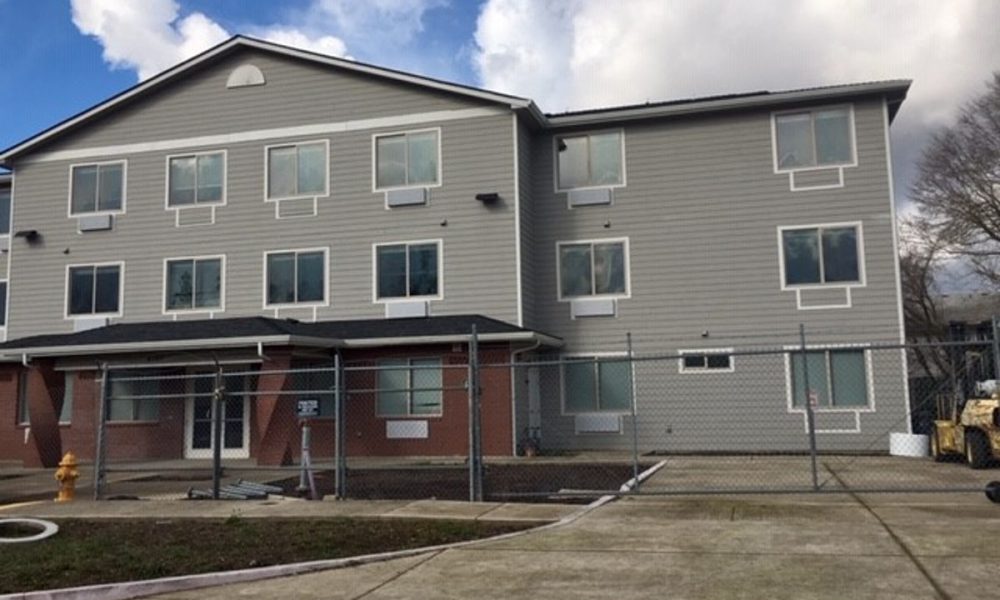
SALEM — It’s getting harder to find a place to live in Oregon, and state lawmakers are making a bipartisan effort to address what some call a housing crisis.
New housing construction isn’t keeping pace with population growth in Oregon, according to state economists. The Up for Growth National Coalition estimates that from 2000 to 2015, Oregon “underproduced” its housing needs by 155,000 units. Increases in real estate and rental prices in the Portland area only recently started easing.
State Rep. Alissa Keny-Guyer, D-Portland, has been working on housing issues in the Legislature since 2013. As chair of the House Human Services and Housing Committee, she’s excited about the work legislators are doing, and she likes many of the proposals she’s seen, including more money for local planning departments, a lifeline for struggling mobile home parks, boosting density in residential neighborhoods and beyond.
She’s worried about how the state is going to pay for them.
About $70 million is being sought for housing-related legislation, House Speaker Tina Kotek said.
“I don’t know if we’ll find the money, but we’re going to try,” Kotek said.
One of her priorities is opening more residential areas to multi-family housing.
House Bill 2001 would require all cities above 10,000 in population to permit a duplex wherever they would allow a single-family house. All cities above 25,000 — as well as virtually the entire Portland Metro area — would have to allow triplexes, quadplexes, townhouses and cottage clusters in residential neighborhoods as well.
The goal, Kotek said, is “to provide more housing choice in residential areas.” Permitting what she calls “missing middle” housing types would mean more rentals that low-income Oregonians can afford, more homes for first-time homebuyers, and more apartments, condominiums and small houses for older adults looking to downsize.
HB 2001 was introduced to significant skepticism from cities and counties, conservative economists, and Republican legislators. But after multiple rounds of revisions, the bill passed out of Keny-Guyer’s committee on an 11-0 vote in favor of passage.
“I was very supportive of the overall concept, and I was very supportive of making some pretty big changes to it, and I think all of that happened,” Keny-Guyer said.
Rep. Jack Zika, R-Redmond, is among the committee Republicans who came around on HB 2001 after initial doubts. He’s still hoping for some more changes, he said, but he is “starting to like the bill.”
“When you need affordable housing, you’ve got to do everything you can,” Zika said.
Rep. Ron Noble, R-Carlton, who was part of a work group Kotek convened to hone the proposal, described his committee vote as a “courtesy yes.” He thinks the bill is better than it was, but he’s still not sold on idea of the state requiring local governments to loosen their land-use rules.
“It’s a hammer, as opposed to a carrot,” Noble said.
The League of Oregon Cities still isn’t on board either, lobbyist Erin Doyle said, but it does think HB 2001 has improved by giving cities more control and more time to implement changes.
HB 2001 is part of a set of bills Kotek is championing. House Bill 2002 is a more technical bill that aims to preserve subsidized low-income housing. House Bill 2003 would compel cities to permit affordable housing on residential land that they own. It would also require them to create more detailed reports on their housing needs and strategies to address them.
Taken together, those three bills would spend more than $4.5 million out of the state’s general fund — largely for “technical assistance” to help local governments with planning — and authorize up to $25 million in lottery bonds for an affordable housing preservation fund.
Kotek’s trilogy of bills have grabbed most of the attention around housing. But there are other proposals under consideration.
House Bill 2228, proposed by Rep. David Gomberg, D-Otis, would allocate $2.5 million for housing-related technical assistance from the state to cities and counties. It’s intended to help small and rural communities, which often have just one planner on their payroll or under contract.
Another set of bills put forward by Rep. Pam Marsh, D-Ashland, would focus on manufactured homes, which she describes as “naturally occurring affordable housing.”
“Typically, it’s less expensive and more accessible to people of lower incomes,” Marsh said.
Marsh’s legislation would let people living in an old mobile home take out a state loan to buy a new one, provide state grants for old mobile homes to be hauled away and disposed, and set up another loan program intended to keep mobile home parks open and affordable for residents.
She has also put forward House Bill 2802, which would make up to $13 million available in grants to help low-income residents with major home repairs. Gomberg, Keny-Guyer and Noble are cosponsors.
“There’s only so much we can do that we drive ourselves as public agencies — only so much housing that we can build,” Marsh said. “We really need to look at ways that we can be effective in the private realm, in helping people to stay in their homes, upgrade their homes and not lose them.”
Programs cost money, though. Budget-writers in the Legislature are already combing through spreadsheets trying to find savings, as key Democrats in Salem concede that the state will have make “difficult” decisions to cut existing services, let alone add new ones.
“I think it’s real easy from an advocate standpoint to really passionately hone in on one program or feature,” said state Rep. Dan Rayfield, D-Corvallis, who co-chairs the Ways and Means Committee. “But then also — looking at what’s the holistic sense — if you were to fund that, what does that take away elsewhere in the budget?”
Keny-Guyer said she it’s frustrating to help craft policies that she believes will help Oregonians, only to watch as the Ways and Means Committee sets them aside for lack of money. It’s happened to her before, and she hopes this year will be different.
“The big message that I keep hearing this session is if you want funding, you have to come up with (revenue),” Keny-Guyer said.
Her solution: Pare back what she calls Oregon’s “largest housing subsidy,” a tax break for homeowners known as the mortgage interest deduction.
Keny-Guyer wants to kill the mortgage interest deduction for second homes, as well as limit it for the state’s top earners. Households with at least $200,000 in annual adjusted gross income would only be able to claim a portion of the deduction; those making an adjusted quarter-million or more wouldn’t be able to claim it at all.
Estimates suggest Keny-Guyer’s proposal, House Bill 3349, would raise about $160 million during the next biennium. Keny-Guyer wants that revenue to be spent on affordable housing and homelessness.
“It’s hard for me to imagine worse places for this money to go than the wealthiest Oregonians,” Keny-Guyer said. “I’m going to fight like the dickens to have it go to housing and the most vulnerable populations.”
Republicans, even those on Keny-Guyer’s committee and sympathetic to her cause, are skeptical.
Zika pointed out that if HB 3349 passes, the Legislature could later decide to redirect those mortgage interest deduction savings — or it could slash the deduction further, so it wouldn’t just affect the 4% of Oregon taxpayers with more than $200,000 in adjusted gross income. Noble said if the state does slap limits on who can claim the mortgage interest deduction, he wants them to be indexed to inflation.
Conservatives have zeroed in on legislation like HB 3349 as an example of Democrats, who hold House and Senate supermajorities this year, trying to tax their way out of a sticky situation with the state budget. Battle lines are already being drawn over a $2 billion tax plan to fund K-12 and early childhood education; other proposals, like a payroll tax to pay for family and medical leave insurance and a sweeping plan to curb greenhouse gas emissions, have also earned the scorn of many business owners, especially outside the Portland area.
Kotek said this week that in the context of those political fights, she doesn’t think the Legislature will “need” to limit the mortgage interest deduction. Raising taxes would require Democrats to flex their supermajorities, since 18 senators and 36 representatives must approve for a tax increase to pass. She’s hoping to find money for affordable housing elsewhere in the budget.
If the Legislature were to cap the deduction, though, Kotek thinks Keny-Guyer has the right intent.
“I think we would have to dedicate it to things that are helping us with our housing crisis,” Kotek said. “Otherwise, I think it would be a hard thing to defend, because I think people understand the nexus between that particular tax break and finding some money to pay for housing.”
Legislators already have passed rent control legislation that Gov. Kate Brown signed into law — it did not require supermajority approval — and last week, the governor signed off on another housing-related bill. House Bill 3336 allows Redmond to expand its urban growth boundary to build up to 485 homes. Half of those homes would be for low-income residents.
“It’s part of a pilot project that we did,” Zika said. “Not only will it help Redmond, I think once this has been implemented and we see that cities can grow affordable housing units, then maybe we can spread it out to all the rest of the cities.”
Legislators could approve other experimental efforts to provide more housing in other areas.
Noble’s House Bill 2997 is tailored for McMinnville, allowing the city to test a broader form of “inclusionary zoning” than Oregon allows in other cities. If it becomes law, McMinnville could pass an ordinance requiring that within a new development of at least 20 apartments or houses, at least one-fifth would have to be built and maintained as affordable housing. The bill passed the House last week 51-8.
Tom Schauer, McMinnville city planner, described the proposal as a pilot project for his city. Noble said he doesn’t know if it will accomplish much, but he thinks it’s worth a shot.
“We need to look at stimulating supply to deal with our long-term housing issues, but we need to come up with something to deal with the short term,” Noble said. “We still have people on the street. We still have people that spend way too much money on housing.”
Rep. Lynn Findley, R-Vale, is sponsoring House Bill 2456, which could bring up to 100 new homes to rural Malheur County, converting two-acre parcels of marginal farmland into home sites.
“We should be able to convert those (acres) to rural residential to see if they will develop and sell and we can have some growth,” Findley said.
The concept is opposed by 1,000 Friends of Oregon. The conservationist group supports housing bills like those Kotek has proposed, but deputy director Mary Kyle McCurdy said she doesn’t believe HB 2456 addresses the affordable housing shortage, and she’s concerned about taking farmland out of production.
Findley disagrees.
“This is not ‘we’re going to do this all over,’” Findley said. “This is ‘let’s try this.’”
Reporter Mark Miller: [email protected]. Miller works for the Oregon Capital Bureau, a collaboration of EO Media Group, Pamplin Media Group, and Salem Reporter.
For the latest news, follow the Enterprise on Facebook and Twitter.
SUBSCRIBE: The Malheur Enterprise’s digital news service, providing complete access to our reporting plus news alerts, is $5 a month. Signing up is easy and secure. Subscribe HERE.




